
Alexander Hamilton was an American military officer, statesman, and Founding Father who served as the first United States secretary of the treasury from 1789 to 1795.

Aaron Burr Jr. was an American politician and lawyer who served as the third vice president of the United States from 1801 to 1805. Burr's legacy is defined by his famous personal conflict with Alexander Hamilton that culminated in Burr killing Hamilton in a duel in 1804, while Burr was vice president.
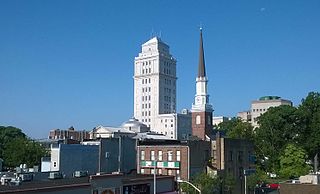
Elizabeth is a city and the county seat of Union County, in the U.S. state of New Jersey. As of the 2020 U.S. census, the city had a total population of 137,298, making it New Jersey's fourth most populous city, after neighboring Newark, Jersey City, and Paterson, The Census Bureau's Population Estimates Program calculated that the city's population was 135,407 in 2021, ranking the city the 207th-most-populous in the country.
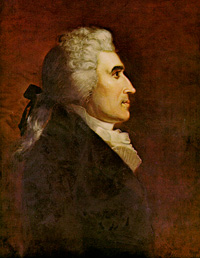
Jonathan Dayton was an American Founding Father and politician from the U.S. state of New Jersey. He was the youngest person to sign the Constitution of the United States and a member of the United States House of Representatives, serving as its third speaker, and later in the U.S. Senate. Dayton was arrested in 1807 for treason in connection with Aaron Burr's conspiracy. He was never tried, but his national political career never recovered.

Aaron Burr Sr. was a notable Presbyterian minister and college educator in colonial America. He was a founder of the College of New Jersey and the father of Aaron Burr (1756–1836), the third vice president of the United States.

Tapping Reeve was an American lawyer, judge, and law educator. In 1784 he opened the Litchfield Law School, the first law school in the United States, in Litchfield, Connecticut.

Aaron Ogden was an American soldier, lawyer, United States Senator and the fifth governor of New Jersey. Ogden is perhaps best known today as the complainant in Gibbons v. Ogden which destroyed the monopoly power of steamboats on the Hudson River in 1824.

The Burr–Hamilton duel took place in Weehawken, New Jersey, between Aaron Burr, the Vice President of the United States, and Alexander Hamilton, the first and former Secretary of the Treasury, on the morning of July 11, 1804. The duel was the culmination of a bitter rivalry that had developed between both men, who had become high-profile politicians in post-colonial America. In the duel, Burr fatally shot Hamilton, while Hamilton fired into a tree branch above and behind Burr's head. Hamilton was taken back across the Hudson River, and he died the following day in New York.

Peter Silvester was an American politician who was a member of the United States House of Representatives from New York, and a prominent Federalist attorney in Kinderhook. He was a mentor to Martin Van Buren, the 8th President of the United States and was the grandfather of New York Representative Peter Henry Silvester.

Boxwood Hall State Historic Site, located at 1073 East Jersey Street in Elizabeth, New Jersey, is a historic house museum operated by the state of New Jersey. Boxwood Hall was built about 1750, and is a National Historic Landmark for its association with Elias Boudinot (1740-1821), who lived here from 1772 to 1795. Boudinot, a lawyer, politician, and diplomat, was president of the Continental Congress 1782–83.

Stephen Bloomer Balch was a Presbyterian minister and educator in Georgetown, which is now part of Washington, D.C. In 1780, Balch established Georgetown Presbyterian Church, which was the second church in Georgetown. He also served as headmaster of the Columbian Academy in Georgetown.
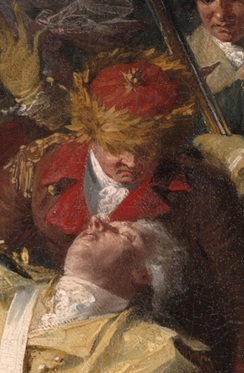
Matthias Ogden was an American soldier and politician. He fought in the American Revolutionary War, and served in various political positions afterwards.
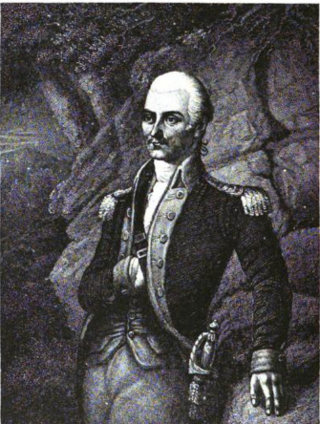
Francis Barber (1750–1783) was a colonel in the Continental Army during the American Revolutionary War. He was in the Sullivan Expedition and at the Siege of Yorktown with the 3rd New Jersey Regiment. He was wounded at the Battle of Monmouth and again at the Battle of Newton. He was killed in New Windsor, New York, where the army was camped in 1783, when a tree that was being cut fell on him as he was riding his horse to dine with George Washington in Newburgh, New York.
Events from the year 1801 in the United States.

The Lawrenceville School is a coeducational preparatory school for boarding and day students located in the Lawrenceville section of Lawrence Township, in Mercer County, New Jersey, United States. Lawrenceville is a member of the Eight Schools Association, Ten Schools Admissions Organization, and a former member of the G20 Schools group.
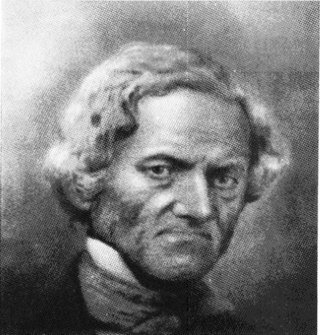
John Pierre Burr was an American abolitionist and community leader in Philadelphia, Pennsylvania, active in education and civil rights for African Americans. He was an illegitimate child of Aaron Burr, the third U.S. Vice President, and Mary Emmons, a Haitian governess who may have been born in Calcutta, India.

Hamilton is a biographical sung-and-rapped-through musical by the American composer and actor Lin-Manuel Miranda. Composed over a seven-year period from 2008 to 2015, the musical tells the story of American Founding Father Alexander Hamilton. Miranda said that he was inspired to write the musical after reading the 2004 biography Alexander Hamilton by Ron Chernow. Miranda says Hamilton was originally a hip hop album in his head. The show draws heavily from hip hop, as well as R&B, pop, soul, and traditional-style show tunes. It casts non-white actors as the Founding Fathers of the United States and other historical figures. Miranda described Hamilton as about "America then, as told by America now."
Duncan Hall School was a boys’ prep school at Scratby Hall in Ormesby St Margaret with Scratby, Norfolk from 1949 to 1986, with girls admitted from 1979. Prior to occupying Scratby Hall, it was located in Great Yarmouth and was called Duncan House.
Jacob Green was a Presbyterian pastor and acting president of Princeton University. A resident of Hanover, Green was also the delegate for Morris County to the fourth assembly of the Provincial Congress of New Jersey in 1776 and served as chairman of the constitutional committee.

















